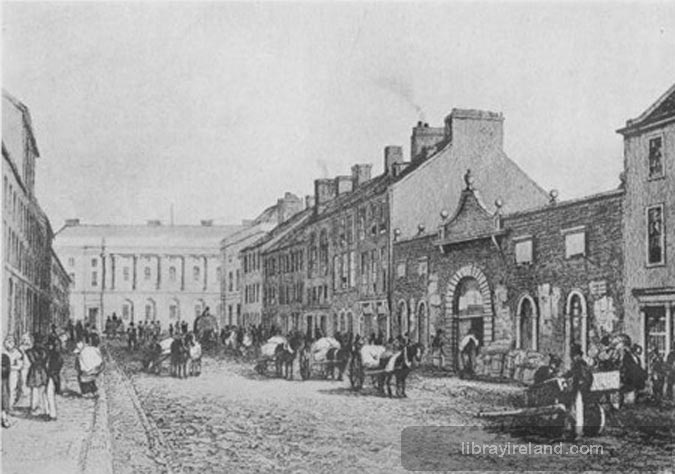Quaint Historical Documents - Story of Belfast
IT certainly was a curious custom when public auctions were advertised as follows: "Auction, to be sold by 'Inch of Candle,' 7 bales of tobacco and 7 ankers of rum."
The Old Sugar House Company offered £52 10s. reward to find out who raised the report that a man fell into a pan of sugar and was boiled to death, and that the sugar was afterwards sold. It is difficult to trace such reports home, and the fifty guineas were never claimed.
There was a Bachelors' Annuity Company in the Market House, but we are not given much information about it.
A most polite advertisement appeared in the papers. "Woulf the Dentist leaves Belfast, but his partner, Mr. Sigmond, will remain for a year longer if he gets encouragement, though, at the same time, he must confess that no ladies he ever knew stood in less need of his assistance or the aid of any art." I wonder if he removed to Blarney.
Some of the old accounts belonging to the Donegall family give us a curious insight into the cost of living in the year 1666; for instance, sixteen yards of "mattin" were used in settling "My Lord and Lady's seat in church." It seems a considerable quantity, but, as it only cost twopence a yard, it really was not expensive.
Again, by my Lady's order, Mr. Charles was supplied with a new grammar at 2s. 8d. He was eighteen years of age at this time. The summer suit for Mr. Charles was certainly not an extravagant item, for it only cost 7s. 1½d. Boots, shoes and goloshes for my Lord cost £1 1s.
In the year 1800, there was a house advertised to be let in Mill Street, with a splendid walled-in garden.
The "Plains"—now covered with houses—Botanic Avenue, University Street and College Green, with the streets adjoining, consisting of twenty-two acres, was let at a yearly rent of £40 free of tithe, as in the past ages this ground was all church lands and was attached to the houses and Monastery at Friar's Bush.
We read also of a curious sepulchre at a place named "Crucmaur," but I cannot find out exactly where it is, and I am sure there are many people who would also be pleased to know. This place exactly fits the size of any person who lies down in it, and a weary pilgrim who kneels three times upon it, is never weary again. There are many weary pilgrims who would like to try it.
There are some interesting and amusing old wills recorded, one made in the year 1655, in which Thomas Dobbin leaves to Alice Dobbin's children one half-crown to be equally divided among them, share and share alike, and the same sum and same manner of division for the children of his two sisters, when they come to demand it.
I wonder how many children there were, and if they had far to travel to receive their share.
But we are surprised at the generous spirit shown by John Taylor, for he left his wife two silver spoons "that were formerly her own." John Taylor could not very conveniently take them with him. I do not think silver spoons were required in the land he was going to, and certainly the lady they belonged to had the best right to them. Another man left his old cloak to a friend, but he distinctly says "the one with the patch on the corner." I trust this bequest was valued as highly as it ought to have been—patch and all.
How the times have changed since those early days! We cannot imagine the astonishment of our great-grandparents, if those venerable people could revisit the haunts of their youth, and see the motors, the telephones and so many surprising things, and perhaps among the most bewildering would be the twentieth century ladies. The calm serenity of life long ago must have had a pleasant side, for they had time to live then, and time to enjoy living in a way we cannot do now. We attempt to fill life too full, we put too much into the time we have, and, when the end comes, we leave the best undone.

